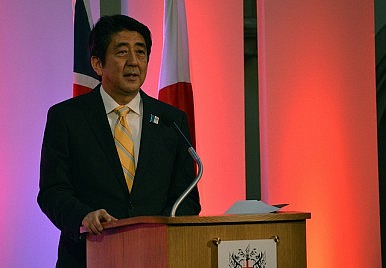Image Credit: Chatham House
More than two years after the return of Shinzo Abe and his Liberal Democratic Party (LDP) to government, few doubts remain that Japan is witnessing a profound shift in the parameters of its postwar security and defense posture. Abe and his LDP have pushed vigorously for the restoration of a “strong Japan” unconstrained by the institutions of its “postwar regime.” The reinterpretation of Japan’s constitution on July 1, 2014 marked the climax of this initiative, permitting Tokyo to exercise its right to collective self-defense in support of its security allies. The consecutive policy measures proposed to readjust the legal framework of Japan’s security system in line with the new constitutional reading have dramatically increased the stakes for Abe and his administration.
This comes as public disapproval of Abe’s security bills has increased sharply. Leading constitutional scholars in Japan have insisted that the legislation violates previous government positions on the scope of Article 9. This view is echoed in recent polls, which reveal that 68 percent of the Japanese public fear that Abe’s security legislation will make it more likely that Japan’s Self-Defense Forces will get involved in armed conflicts. Meanwhile, 84 percent of the public have complained that Abe has not sufficiently explained this key legislation. To temper public criticism, Abe has extended the current Diet session by an unprecedented duration of 95 days, until September 27.
Abe has repeatedly declared Japan’s “departure from its postwar regime” as the cornerstone of his political legacy, and has invested significant political capital in pushing the controversial security bills through the Diet. This has in turn thrown into sharper relief Abe’s pledge to revise Japan’s posture towards its wartime history. As we approach the 70th anniversary of Japan’s surrender on August 15, observers in China, South Korea, and the U.S. have expressed concerns that a new Abe Statement may deviate from the 1995 Murayama Statement, which offered an apology for the suffering and damage caused by Japan’s history of aggression in Asia.
Yet the dynamics that have converged over Abe’s security bills have created new constraints and requirements that will help to keep the genie of historical animosity in its bottle. Thus, as Abe is entangled in a political battle over the security bills that will determine the future of his government, it is unlikely that he will provoke domestic and international criticism over a controversial statement to be delivered on August 15 (or worse, with a visit to Yasukuni).
In fact, the signs suggest that Abe is seeking ways to restore good relations with South Korea and China. The Japanese prime minister has worked overtime to resume dialogue with Seoul in the wake of the 50th anniversary of the normalization of diplomatic relations between the two East Asian neighbors. This effort resulted in a high-profile visit by ROK Foreign Minister Yun Byung-se to Japan in June. A previously scheduled visit by Yun to Japan was canceled following Abe’s Yasukuni pilgrimage in December 2013. Talks between Yun and his Japanese counterpart Fumio Kishida have hinted at the possibility of a bilateral meeting between Abe and ROK President Park Geun-hye in September. In addition, Japan, South Korea and China have moved towards reinitiating the Trilateral Summit Meeting (TSM) scheme as early as autumn this year. If realized, this would be the first TSM since its last convention in Beijing in 2012. Evidence for dialogue and reconciliation in preparation for Abe’s August speech include Japanese media reports suggesting the dispatch of Abe’s top national security adviser-cum-National Security Council chief Shotaro Yachi to China in July. Yachi is expected to consult with China on Abe’s statement on Japan’s wartime history. In light of the conflict over territorial claims in the East and South China Seas, Tokyo and Beijing have agreed to install a new crisis management mechanism to reduce the risk of military confrontation. These steps indicate careful policy coordination as Japan seeks to reduce the potential risks of diplomatic conflict over its historical legacy.
The bottom-line: As relations with South Korea and China are slowly improving, Abe will not waste his political capital by provoking new spats with Japan’s neighbors, as this will only jeopardize the passing of his security bills in September. Moreover, ahead of the LDP party leader election scheduled for September 20, Abe has struggled to deter criticism over his political course and to keep his party in line. Recent events have illustrated some of the challenges. Take, for instance, the controversial statement offered by novelist and former NHK board member-cum-Nanjing-denier Naoki Hyakuta at a LDP party meeting, in which he called for the dismantling of Japan’s liberal newspapers critical of Abe. That statement unleashed massive public protest. Revelations of leaked pension data and criticism over Abe’s handling of the relocation of U.S. military bases on Okinawa have further diminished Abe’s political credibility.
Despite stable majorities in both houses of the parliament, Abe and his LDP-led government have shown signs of weakness and vulnerability. A decline of Abe’s support rate from 45 to 39 percent in recent polls (though still high in comparison to previous cabinets) suggests the line between public tolerance of and opposition to Abe’s revisionism is indeed a thin one, if revisionism comes at the price of delayed social and economic reform. If Abe wishes to succeed in his attempt to revise Japan’s postwar security system, the crafting of diplomatic stability and trust in Japan’s relations with China and South Korea will be a critical prerequisite. Hence, observers anticipating political drama from Abe challenging Japan’s consensus on its wartime history may be disappointed on August 15.
By Sebastian Maslow
Sebastian Maslow is assistant professor for political science at the Graduate School of Law, Tohoku University. He tweets on Japan’s politics @smaslow_japan.
sourche: http://thediplomat.com/2015/07/reconciliation-or-revisionism-what-not-to-expect-from-shinzo-abe/

Δεν υπάρχουν σχόλια:
Δημοσίευση σχολίου